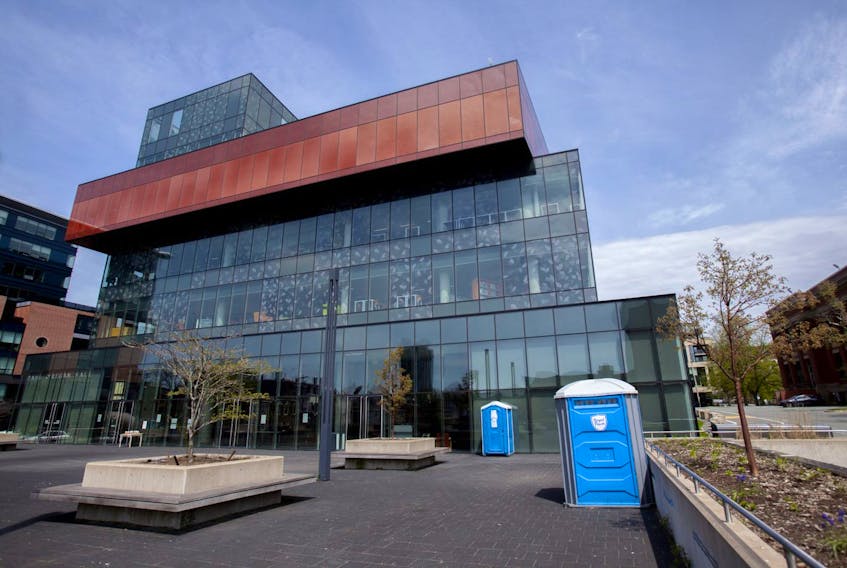In a few days, Nova Scotians will be able to enjoy a dine-in meal and get their long-awaited haircuts. But as more people venture outside their homes for longer periods of time, a trip to a public bathroom is inevitable.
If people loathed the trip in the past, it's become essential with COVID-19. Public washrooms are the only way they can maintain the gold standard of public health rules: handwashing.
As part of its Mobility Response Plan, the Halifax Regional Municipality installed two portable washrooms in the plaza behind the Halifax Central Library. The lack of public washrooms had left vulnerable people, such as those who are homeless and not connected to a shelter, with few options to wash their hands or relieve themselves. On the other hand, this essential space represents what people have been avoiding for the past few months: small confined spaces filled with high-touch surfaces that they must share with strangers.
Lisa Barrett, a medical doctor and clinician-scientist who studies infectious disease, says fear of COVID-19 shouldn't stop people from using the washroom.

“The chance that a public washroom in and of itself is risky is not the case.”
It's because Sars-cov-2, the virus causing COVID-19, is a respiratory virus. It mainly spreads through droplets that come from talking, coughing, or sneezing. A person gets infected if they come in close contact with a sick person or when they touch a contaminated object, and then touch their face.
If people keep a safe distance from others, there's little chance for them to get infected.
“If there's not enough space to maintain distance of up to two metres without a barrier between them, then they should wait until the person comes out before they enter.”
Could flushing the toilet spread the disease?
Although Sars-cov-2 is a respiratory virus, researchers in China have found evidence of virus particles in the stool of 39 hospitalized patients who tested positive for COVID-19. The study examined 71 patients.
Flushing the toilet could generate aerosols that could spread the virus, putting people at risk. Aerosols are tiny particles that could linger in the air for long periods and distances.
“The risk is very, very, very low that that flushing procedure is going to generate a six-foot aerosol full of infectious virus that's going to pop itself into your eyes, nose or mouth.”
For one thing, it's not clear whether the virus particles found in the stool of patients can cause COVID-19. There are also no cases of the virus spreading to people through fecal transmission.
“Throughout all the 5.5 million cases in the world so far we haven't seen that that's been the mode of transmission. So, it's less likely that this is a major contributor to the way we get infections.”
Barrett says if people are still concerned, they can put down the toilet lid before flushing.
“The other option is to make sure that you are not spending any great amount of time in that space after the toilet's flushed if you're worried and if you don't have a lid you can put down on the actual toilet.”
Cleaning doesn’t replace good personal hygiene
It's also important to keep public washrooms sanitary. This doesn't only apply to the toilets themselves, but also includes cleaning surfaces that people frequently touch including doorknobs, doors latches, toilet paper holders and taps, if they're not touch free.
“But this is no more important than it would be on a regular day or season.”
Barrett says it's because public washrooms are a spreading ground for all kinds of infectious viruses that people need to be protected from all year.
“I never say no to more cleaning but what I do say no to is shutting down public washrooms because people say they can't be cleaned six, seven, eight times a day … that just reduces the public's ability to be able to access a very important service.”
Barrett says it's easy to judge the cleanliness of a public restroom. The first sign is whether it's well-stocked with items such as toilet paper and sanitizer.
“The things I look for are just physically: does it look clean or not?” she says. “I like it when there are checklists there that tell me the staff have been in.”
In all cases, responsibility lies on people to practice good personal hygiene. This means that there's no room for people to ignore washing their hands after using the washroom.
If people have the option, Barrett suggests using paper towels instead of air dryers.
“Especially at a time like this when there may be reasons to watch the airflow,” she says.
“It also is faster than having people stand around waiting for the dryer to dry their hands and at this point where we're trying to reduce congestion of lots of people in one space.”
Anyone who has tested positive for COVID-19, who has symptoms, or who has had contact with a COVID-19-positive case must stay home. It's not only to protect other washroom users, but also those who clean the washrooms.
“Those are the three key parts that are way more important than worrying about things like swabbing groceries and toilet seats.”
Nebal Snan is a local journalism initiative reporter, a position funded by the federal government.









